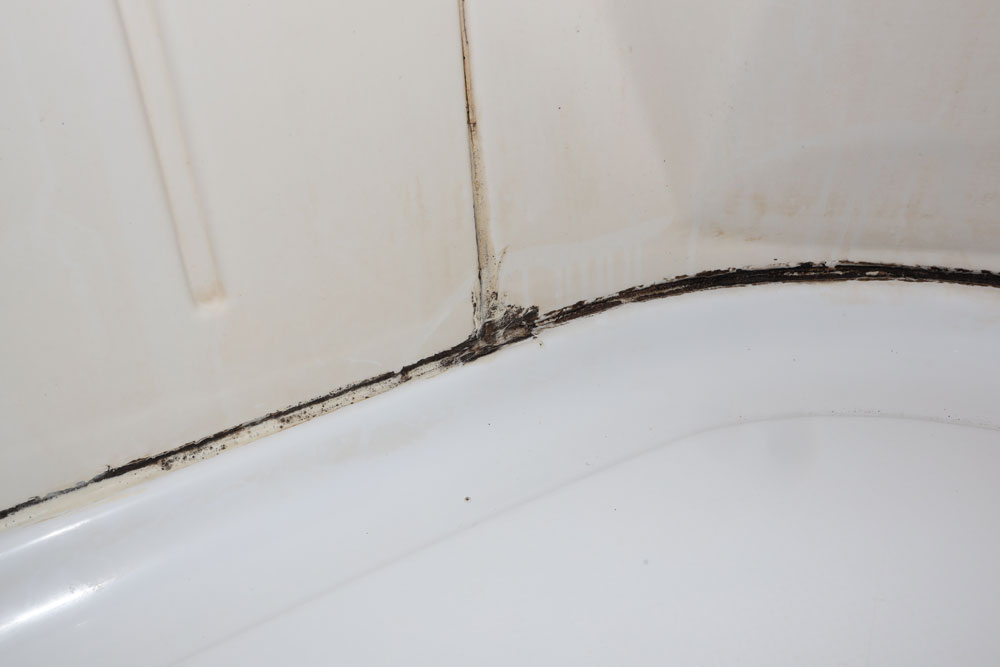How To Get Rid Of Black Mould In The Shower
 CONTENTS
CONTENTS
- What is black mould?
- Is black mould dangerous?
- How to remove black mould from the shower
- How to prevent mould growth in your shower
- Get in touch
Black mould is a common feature in bathrooms as it usually provides the fungus with its ideal conditions for growth. Swift removal and effective prevention methods are essential to protect your health and minimise damage to your possessions and property.
Our mould removal specialists can quickly remove all the mould growing in your home - including mould in the air - and provide you with bespoke advice on how to prevent it returning. We also offer a lifetime guarantee* with our mould remediation services, here at ICE Cleaning, so in the unlikely event the mould comes back, we will remove it again for free.
Continue reading to find out more about how to remove black mould growing in the shower.
*subject to advisories
What is black mould?
Mould is a type of fungus that thrives in moist environments. It reproduces by producing tiny spores which can spread easily through the air and settle on surfaces where they grow. Black mould is an umbrella term for moulds that are dark or black. The most common types of black mould that can be found in the home include Stachybotrys chartarum, Alternaria, and Cladosporium.
Mould grows in environments that contain excess moisture. It is usually caused by high humidity, rising and penetrating damp, and condensation. Bathrooms are usually very steamy and humid, and condensation tends to form on the windows and walls during washing, so they are the ideal place for it to grow. Shower cubicles tend to contain organic material like soap residue and dead skin that the mould can feed off, too.
Another key cause of mould in bathrooms is poor ventilation and airflow. Most bathrooms have small or no windows which means humid air can get trapped inside the space and make surfaces damp.
You can often find black mould in the shower grout and silicone, and on the bathroom walls or ceiling. However, it will grow anywhere there is moisture, organic material, oxygen, and warmth.
Is black mould dangerous?
Mould produces allergens, irritants, and sometimes mycotoxins (toxic substances). Inhaling, touching, and ingesting mould can put you at risk of a range of health problems from an allergic reaction to respiratory infections.
Some types of mould, including several types of black mould, produce the toxic substances which are linked to more serious health issues including severe asthma attacks and sick building syndrome.
People with weakened immune systems and respiratory problems, or young children and elderly people may experience more serious reactions when exposed to black mould. Long-term exposure can have even more dire effects.
It is essential that any signs of black mould are addressed promptly by professionals who specialise in mould removal. You can learn more about the dangers of black mould here.
How to remove black mould from the shower
While there are numerous DIY solutions recommended online for getting rid of black mould in the shower, these methods often fail to address the root cause and may inadvertently spread the spores further throughout your home.
Scrubbing at the mould, for example, may aggravate it and cause it to release spores. Using a harsh chemical on the other hand, like bleach, can damage the surface the mould is growing on.
Cleaning the mould will also expose you to the harmful fungus and put you at greater risk of inhaling, touching, and ingesting it. Mould removal specialists have the expertise and equipment, including personal protective equipment, to safely and thoroughly tackle your mould problem.
They can even do it without risking further contamination in your home, such as sealing off the area being cleaned to stop spores travelling around the property during cleaning.
As well as eliminating all traces of the mould in your home, experts can determine the specific cause of the mould in your home and help you pinpoint the best ways to stop it coming back. You can find out what kills black mould in this blog.
How to prevent mould growth in your shower
- Ventilation: Improve airflow by installing an exhaust fan or regularly opening windows during and after showering.
- Routine cleaning: Clean your shower using anti-microbial products to remove dead skin, soap scum, bacteria, dirt, and dust, all of which mould can feed off.
- Dry surfaces: After showering, wipe down walls and floors to remove excess water.
- Frequent inspections: Check for leaks around taps and plumbing to catch them early before they cause a moisture problem.
Get in touch
Our nine-step mould remediation process can eliminate all the mould in your property and give you peace of mind it is gone for good. No matter where you are, our mould specialists can help. They are available nationwide, 24/7, 365 days a year.
Contact our team by calling 0208 066 0360 or sending an email to enquiries@icecleaning.co.uk to book your mould removal service today.

Speak with me today,
I’m here to help
By asking you a few questions either via phone or email I can immediately provide a realistic estimation of the cost.

Why choose us?
- Cater to a wide variety of cleaning situations
- Nationwide coverage, available 24/7
- Cater to commercial and domestic clients
- Free survey provided prior to quotation
- Emergency response team
- Offer a bespoke service designed to suit all your needs
- All technicians hold professional health and safety qualifications, including BICSc, IOSH, Dewpoint Professional & Safe Contractor
We’re fully accredited
We place best practise, professional expertise and health and safety at the core of our business. We’re fully compliant with all legal obligations. You can view a list of our accreditations below, or visit our Health & Safety page for more information.











-RGB-small.1707319151.jpg)




















